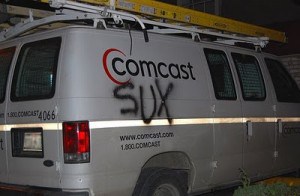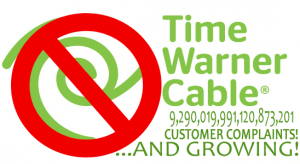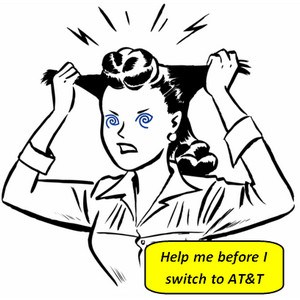 Big cable and phone companies can thank 2011’s Hurricane Irene for keeping them from scoring #1 on the American Customer Satisfaction Index’s top most disliked companies in America. Those choice spots were reserved for utility companies on Long Island and in Connecticut.
Big cable and phone companies can thank 2011’s Hurricane Irene for keeping them from scoring #1 on the American Customer Satisfaction Index’s top most disliked companies in America. Those choice spots were reserved for utility companies on Long Island and in Connecticut.
But even the rain-soaker that left millions without power for weeks couldn’t keep America’s perennial hatred of cable and phone companies from the top 15 list:
#3 Charter Communications – The “Don’t Care-Bears” of Cable
America’s worst cable company delivers downright shoddy customer service and dodgy billing practices a loan shark would not dare try. The company has been flopping around like a beached whale since exiting its “stiff our creditors good with a quick trip to bankruptcy court,” and is now back to stiffing their customers instead:
“The sales rep originally promised us a $42.95 a month for services, with an introductory price of $24.95 for the first 3 months (a savings of $18 a month). After the introductory period ended, the company started charging me $56.95, when I finally caught on that they were charging me $14 more per month than what is said on the Work Order (could provide at anytime for proof), he never once mentioned that there will be a $10 more per month, and now the company says if you have no other cable service with us (Charter Communications), you are to be charged $10 more per month!!”
 #4 Comcast – Hey, It Could Be Worse — At Least We’re Not Charter!
#4 Comcast – Hey, It Could Be Worse — At Least We’re Not Charter!
Comcast had a bad year with faulty e-mail, failing equipment, and more excuses than CVS has pills. Unprofessional contract installers also have problems keeping their hands to themselves. The largest cable operator in the country has also been known to empty checking accounts when they want their money, and there are horror stories about installers leaving wires, clips, and nails scattered on front lawns, quickly becoming projectiles when the mower runs over them.
Their cable service shampoos in mediocrity scoring 61 out of 100 and the “digital phone” service they run is the conditioning rinse, doing slightly better with a score of 67.
#6 Time Warner Cable – Always Listening to Customers, and Then Ignoring Them
 Rated 63/100, Time Warner Cable managed a four point improvement over last year, which will be promptly erased if they keep experimenting with Internet Overcharging schemes.
Rated 63/100, Time Warner Cable managed a four point improvement over last year, which will be promptly erased if they keep experimenting with Internet Overcharging schemes.
Derided for “third world” customer service worthy of a despotic backwater dictatorship, slow Internet speeds, endless outages, and gouging rates, the ACSI has few nice things to report about America’s second largest cable conglomerate.
One customer vented, “TWC has destroyed my business and doesn’t give a damn: I first complained five weeks ago about outages and miserable upload speeds. I need to send large files to clients. I’ve had two technicians visit, who both found it was in the neighborhood. Today, I found the situation has not changed and am told there’s no further work order.”
Customers also complain about being stuck with Time Warner because there are no competing services in the area.
That being said, we’d rather have Time Warner Cable than AT&T or Comcast, and our personal customer service experience in western New York has been excellent for us, so it depends on where you live (and what competition they have in your area.)
#7 Cox Communications – Beam Me Up, Scotty!
 Now we know where Time Warner’s four extra points came from — at the expense of Cox Cable, which is down by that same amount turning in a truly pathetic score of 63 out of 100.
Now we know where Time Warner’s four extra points came from — at the expense of Cox Cable, which is down by that same amount turning in a truly pathetic score of 63 out of 100.
Time Warner Cable occasionally threatens to buy out Cox, at least if industry rumors prove true, which might actually be an improvement.
Cox’s problem is time-honored for the cable industry — it gouges customers with outrageous rate increases the oil and gas industry don’t have the stomach to attempt.
Customers complain Cox is the High Priestess of Bait & Switch, signing customers up on one promotion and then shifting them to another, pretending the original offer was a figment of someone’s imagination. One customer:
“I setup 2yr service w/Cox —1st yr @ $29.99, 2nd @ $49.99. Now after 6mon they changed it to 1st 6mon @ $29.99, 2nd 6mon @ $49.99, and 1 year @ 79.99.”
#11 CenturyLink – (Last)CenturyLink — America’s Worst Phone Company (Hey Frontier, You Get a Pass This Time)
 CenturyLink, you must be so proud of your 66/100 score. In fact, add one more “6” and you’ll convince customers who already suspect you are the devil’s phone company.
CenturyLink, you must be so proud of your 66/100 score. In fact, add one more “6” and you’ll convince customers who already suspect you are the devil’s phone company.
“They lie about everything and do nothing,” one customer told ACSI. “I have been having issues with my Internet for a year and they have yet to help.” Another customer wrote that they’ve “had issues with CenturyLink employees flat out lying to [me] about the bill.”
Billing issues are most likely to be cited by complaining customers along with customer service representatives having less knowledge about the company’s products than customers do.
 That being said, at least they don’t have the Frontier employee who insisted on telling us about the company’s wireless “wee-fee” network. She admitted she had no idea it was “Wi-Fi.”
That being said, at least they don’t have the Frontier employee who insisted on telling us about the company’s wireless “wee-fee” network. She admitted she had no idea it was “Wi-Fi.”
#14 DirectTV – Hey, We’re Looking Pretty Good Compared to the Other Guys
The satellite company managed 68/100, and the biggest problem they still have is misleading contracts and promotions that leave customers out of pocket for hundreds of dollars for deals that go un-honored and rebates that never arrive.
Discounts seem “luck of the draw” among customer service representatives:
“DirectTV raised the price for 30% after one year and said that they told me about this verbally, which is not true. My agreed price with Saha on the phone, a DirecTV employee, was $56.99 including two receivers and one HD/DVR receiver. DirecTV overcharged me on my first bill. When I complained, they said they forgot to give me my 30% discount. So over the next six months, they kept revising my bill but never got it right.”


 Subscribe
Subscribe












